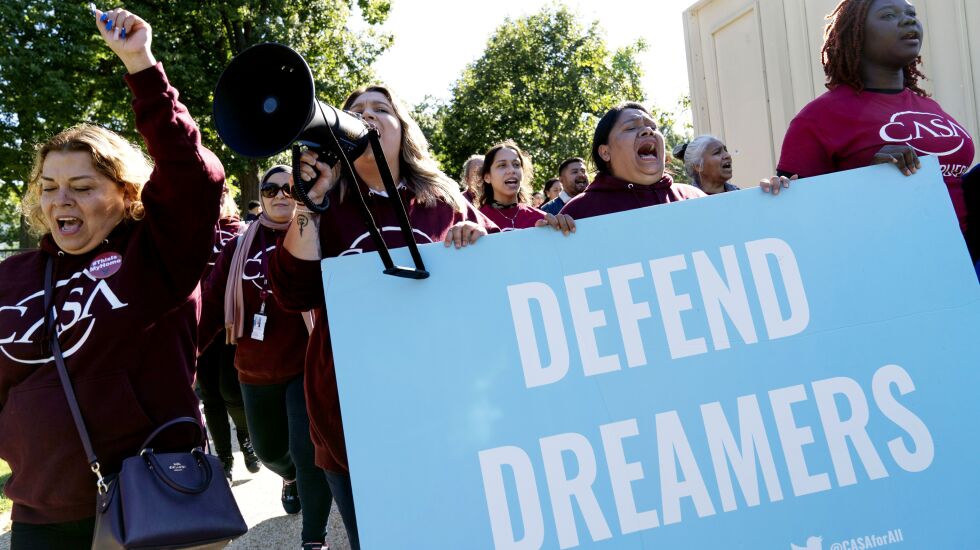
We are running out of time to save DACA, a program created in 2012 to provide temporary legal status for hundreds of thousands of childhood migrants who know no other home than the United States. DACA has strengthened our economy and is supported by 75% of the American people.
Still, a decade-long right-wing attack on the program is reaching its conclusion in court, where the conservative 5th U.S. Circuit Court of Appeals affirmed a lower court’s ruling that DACA (Deferred Action for Childhood Arrivals) was unlawful, meaning the end of the program is almost certainly near.
The stakes could not be higher. The end of DACA would uproot the lives of 600,000 DACA recipients in addition to the more than 1.3 million migrants eligible for the program. (The Trump administration stopped new DACA applications as part of its anti-immigrant agenda.)
Aside from ending the antiquated filibuster, there is only one path forward: We need 10 Republicans in the Senate to join Democrats and pass the American Dream and Promise Act, a bill that provides legal stability and a path to citizenship for DACA recipients and eligible migrants. But Republicans have already signaled that they will kill the bill if they take control of either the House or Senate next year. That’s why we need to pass it now.
Here’s what I want Republican colleagues in the Senate to hear about DACA and why it’s our obligation to offer a pathway to citizenship now, before it’s too late:
Try to put yourself in Yesenia’s shoes.
When it became time to take driver’s ed in high school, Yesenia’s teacher forced her to provide a social security card, even though he knew Yesenia was undocumented, did not plan to get a license and had no real need to bring a social security card to class. When Yesenia was ultimately unable to produce a social security card, a classmate exclaimed to a crowd of laughter, “She can’t bring it because she’s illegal.” Yesenia nearly broke down in tears. Being undocumented amplifies the normal challenges of growing up.
So when President Barack Obama in 2012 announced DACA, Yesenia was afforded a stability she’d never known, no longer carrying the fear of being deported and separated from her family. She could finally live without the fear of “driving, traveling, and being denied the opportunity to work.” And Yesenia was able to continue her education at Illinois State University and went on to pursue a masters degree at the University of Illinois at Chicago.
Or think about Elizeth, who woke up at 3:30 a.m. every day to prepare tamales and sell them before hurrying to school, as she did through elementary and middle school. Classmates belittled Elizeth, calling her “la tamalera.” Like Yesenia, Elizeth applied for DACA. Eventually, Elizeth saved enough by selling tamales to pay her way through college.
Both Yesenia and Elizeth are my constituents. DACA recipients are your constituents too.
Every DACA recipient has a story. A million and more stories of homes lost and new homes found, stories of growing up, stories of pain and perseverance that demand action.
This is my story too. I migrated to the United States when I was 9 years old, like Yesenia and Elizeth. I gained permanent residence status and eventually obtained citizenship through my father, Miguel, who moved to Chicago years earlier as part of the Bracero program, a World War II migrant worker program. Now these same pathways to citizenship, which for years had bipartisan support, no longer exist.
We must think about the consequences of Senate inaction in human terms. If we don’t save DACA, what will happen to Yesenia? Will she be deported, forced to go back to Mexico? What about Elizeth?
Ending DACA will shatter the lives of nearly 2 million people in our country who were brought here as children. It will separate families and tear communities apart.
Yes, DACA recipients pay $9.4 billion in taxes each year and our economy benefits from their $25.3 billion in spending power. And let’s remember that more than 200,000 DACA recipients across the country — in red states and blue states — worked as nurses, grocery drivers and teachers during the early days of the pandemic. DACA recipients were some of the essential workers that quite literally kept our country going.
Our obligation to protect DACA should not stem from the economic benefits. Our obligation is a moral one. This is about who we are as a country.
The time is now to protect DACA and bring stability to the lives of nearly 2 million DACA recipients and eligible migrants by providing a path to citizenship. We must pass the American Dream and Promise Act.
U.S. Rep. Jesús “Chuy” García represents the 4th District of Illinois. He is the only Mexican immigrant in the U.S. Congress representing the Midwest.
The Sun-Times welcomes letters to the editor and op-eds. See our guidelines.
(The views and opinions expressed by contributors are their own and do not necessarily reflect those of the Chicago Sun-Times or any of its affiliates.)







